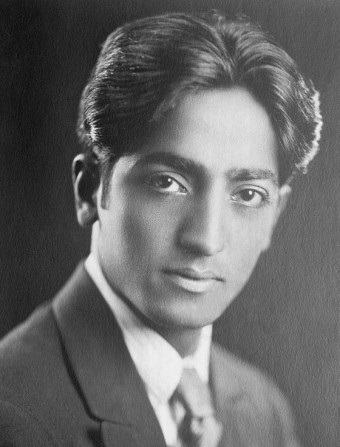This Day in History: February 17th- Krishnamurti
This Day In History: February 17, 1986
 “When one loses the deep intimate relationship with nature, then temples, mosques and churches become important.” – Krishnamurti
“When one loses the deep intimate relationship with nature, then temples, mosques and churches become important.” – Krishnamurti
Death came peacefully to the 90 year-old Indian philosopher Jiddu Krishnamurti, who passed away on February 17, 1986 at his home in Ojai, California. Always a reluctant guru, his final wish was that the several schools he had founded in the U.S., India and England would remain operative, but that no one person should be singled out to “carry on with these teachings in my name now or at any time in the future.”
Krishnamurti was born in 1895 in Madras, India. Through his father’s involvement with the Theosophical Society, an organization that promoted religious unity within the parameters of Indian philosophy, he attracted the attention of the organization’s leader, Annie Besant.
Besant proclaimed Krishnamurti “world teacher”, and he began a rigorous training path geared to fulfilling this role. He studied in England and France, accompanied by his brother Nitya. In 1922, the brothers moved to Ojai, California, hoping the climate would help Nitya’s tuberculosis.
Unfortunately, his brother passed away in 1925, but Krishnamurti remained in Ojai. Annie Besant started a group called the Order of the Star created solely for Krishnamurti to address his followers, but by 1929, he proclaimed the Order dissolved. He had never been comfortable with claims that he was exalted or semi-divine, and when he disbanded the group of 50,000 adherents he explained, “I maintain that the truth is a pathless land and you cannot approach it by any path what-so-ever, by any religion, by any sect.”
Krishnamurti spent the remainder of his long life writing and giving lectures around the globe on his non-dogmatic philosophy of self-reliance and self-awareness. The philosophy Krishnamurti held maintains that human misery can be traced back to the insatiable need for self affirmation. This not only includes selfishness and greed, but also such characteristics as fear, anxiety and aggression. Krishnamurti believed enlightenment could only be achieved when the deeper levels of the psyche were reached and the superficial trifles of the ego eliminated. Only then could the personality be truly integrated, and love unconditionally and selflessly.
After Krishnamurti’s death from pancreatic cancer, his body was cremated and his ashes scattered in India, England and California. The Prime Minister of India, Rajiv Gandhi, stated: “The People of India deeply mourn the passing away of Sri J. Krishnamurti. He was one of the most stimulating philosophers of our land and age. … Our country and the world are poorer with his death.”
If you liked this article, you might also enjoy our new popular podcast, The BrainFood Show (iTunes, Spotify, Google Play Music, Feed), as well as:
- The Song Commonly Called “Teenage Wasteland” is Actually Named “Baba O’Riley”
- The Beatles Song Named for a Woman that was About a Man
- The Monks Who Self-Mummify
- How the Dalai Lama is Chosen
- A Memory of Solferino – The Life of Henry Dunant
| Share the Knowledge! |
|





This man was TRULY amazing- in that he DIED before he was BORN!
Please check the dates in your article….
@WildLatin: A Universal truth I’ve found both in all writers and all audio people is when a date is supposed to be 18XY, particularly in the 1870s through the 1890s, they invariably write or say 19XY. Sort of an odd phenomenon, but I’ve yet to have a single writer or audio person work for me that had to talk about an 18XZ date that hasn’t done that at least once. And I myself have been guilty of it several times. 🙂 In any event, thanks for catching that. Fixed.
Quoting the article: “The philosophy Krishnamurti held maintains that human misery can be traced back to the insatiable need for self affirmation.”
Jews and Christians, however, believe — based on direct revelation from God Himself — that “human misery can be traced back to” what is called “original sin,” the grave offense, rooted in prideful disobedience, committed by the first two people that God created. (The original sin is described — symbolically, most believe — in the account of “Adam” and “Eve” in the Bible’s book of Genesis.)
Whereas Krishnamurti believed that “enlightenment could only be achieved when the deeper levels of the psyche were reached[, …] the superficial trifles of the ego eliminated[, … and], the personality be truly integrated and love unconditionally and selflessly.”
Christians know, however, that God “enlightens” mankind, through His Holy Spirit revealing the truth preseverd by His Church. Yes, egotism must be eliminated, and people must “love unconditionally and selflessly,” but this cannot be done through mere human will power. It can only be done through man’s acceptance of God’s sanctifying grace (which begins to be received through Baptism).